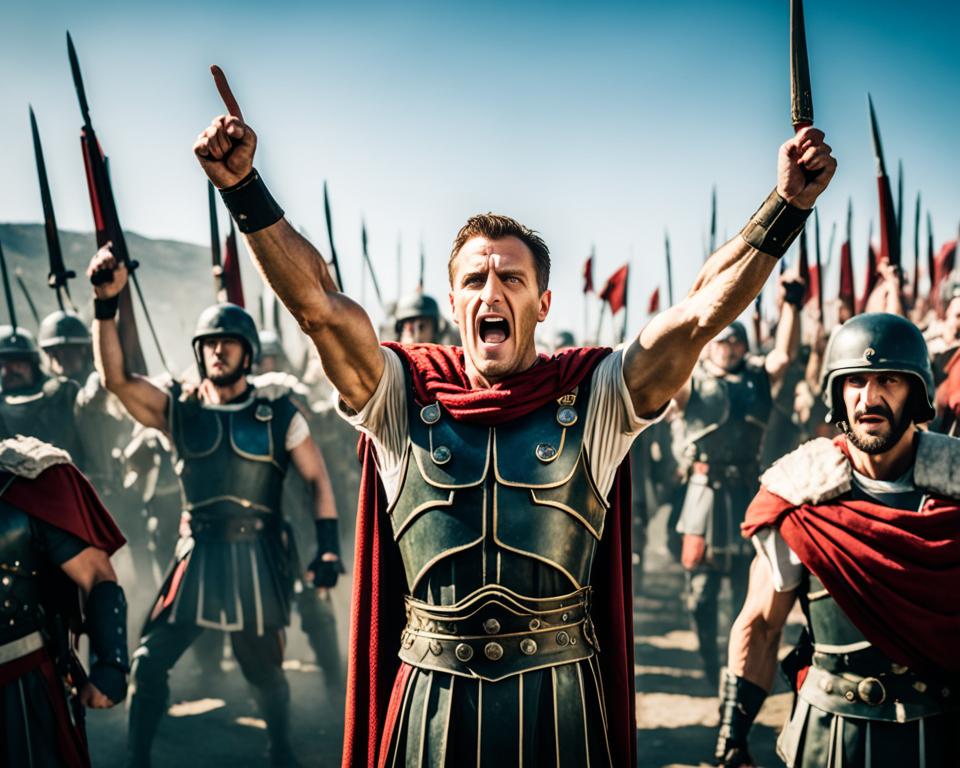Julius Caesar, a prominent figure in Roman history, possessed a unique and influential leadership style that left a lasting impact. His exceptional strategies and charismatic characteristics set him apart from his contemporaries, making him a noteworthy study in effective leadership. By delving into Caesar’s leadership approach, we can gain valuable insights that continue to be relevant in today’s world.
Table of Contents
Connection with Soldiers
Julius Caesar, known for his exceptional leadership qualities, had a unique ability to forge personal connections with his soldiers, demonstrating his remarkable leadership approach. He went beyond being a distant commander and took the time to know the names of each soldier fighting under him. This personal touch created a sense of camaraderie and trust within the ranks, fostering an environment of unity and loyalty.
Caesar’s dedication to establishing connections with his soldiers served a crucial purpose – it bridged gaps within the army and reinforced the command structure. By building relationships with his troops, he gained their unwavering support and earned their respect. This connection with soldiers not only boosted morale but also increased their willingness to go the extra mile in battle.
This leadership lesson from Julius Caesar emphasizes the significance of fostering personal connections and developing strong relationships within a team. While leaders may not have the opportunity to be best friends with every team member, establishing personal bonds can enhance overall morale and create a stronger sense of unity, which is vital for driving success.
Benefits of Personal Connections
Building personal connections with team members can yield numerous benefits. It helps leaders understand the strengths and weaknesses of their soldiers, allowing them to allocate resources effectively and delegate tasks accordingly. Additionally, personal connections create a sense of trust and loyalty, leading to better collaboration, open communication, and improved team dynamics.
By following Julius Caesar’s example, leaders can cultivate a supportive environment where team members feel valued and motivated. This can inspire them to give their best efforts and foster a sense of pride and ownership in their work.
| Leadership Qualities | Description |
|---|---|
| Empathy | Understanding the needs and emotions of soldiers to provide effective guidance |
| Trustworthiness | Building trust through consistent actions and transparent communication |
| Communication | Conveying expectations clearly and actively listening to soldiers’ concerns |
| Motivation | Inspiring soldiers through recognition, encouragement, and setting challenging goals |
| Accountability | Taking responsibility for decisions and actions, leading by example |
Effective Communication Skills
Julius Caesar was not only a skilled military strategist but also a proficient communicator. He possessed the ability to deliver powerful and persuasive speeches, captivating both the Roman Senate and his soldiers. Effective communication is a crucial skill for leaders, as it facilitates the conveyance of messages and encourages team engagement.
Strong communication skills allow leaders to clearly articulate their vision, goals, and expectations to their teams. By effectively expressing their ideas and strategies, leaders can inspire trust and motivate their followers to work towards a common objective.
Julius Caesar’s exceptional communication skills enabled him to inspire loyalty and commitment among his soldiers. His commanding presence and eloquence instilled confidence in his troops, fostering a sense of unity and purpose within the army.
Leaders can learn from Caesar’s approach and strive to improve their own communication abilities. By actively listening, adapting their message to different audiences, and using non-verbal cues effectively, leaders can enhance their communication skills and build stronger connections with their teams.
Key Strategies for Effective Communication:
- Clearly define and convey the vision and goals of the team
- Use active listening techniques to understand and address concerns
- Adapt communication style and message to different individuals and situations
- Encourage open and honest dialogue within the team
- Provide constructive feedback and guidance to team members
The ability to communicate effectively is an essential trait for successful leaders, just as it was for Julius Caesar. By mastering this skill, leaders can inspire and motivate their teams, foster collaboration, and achieve remarkable results.
Information Sharing and Empowerment
Julius Caesar’s leadership style extended beyond personal connections and effective communication skills. Another hallmark of his approach was the emphasis on information sharing and empowerment. Caesar understood the importance of keeping his centurions, the team and department leaders, well-informed about his battle plans and strategies. This ensured that everyone involved understood the vision and goals, promoting a culture of transparency and collaboration.
By sharing vital information with his centurions, Caesar empowered them to guide their teams towards success. They were equipped with the knowledge and insights necessary to make informed decisions and lead their soldiers effectively. This approach not only fostered effective communication but also allowed for agile adjustments on the battlefield, as each centurion had a clear understanding of the broader strategy.
Leaders today can learn from Caesar’s emphasis on information sharing. By providing necessary information, leaders can ensure that their teams understand the vision and goals, encouraging active participation and collaboration. This creates an environment where every team member feels empowered to contribute their ideas and expertise, leading to more innovative solutions and improved outcomes.
Key Takeaways:
- Emphasize information sharing to foster transparency and collaboration within the team.
- Equip team leaders with the necessary knowledge and insights to guide their teams effectively.
- Promote a culture where every team member feels empowered to contribute their ideas and expertise.
Embracing Responsibility and Celebrating Success
Julius Caesar demonstrated a strong sense of responsibility by being actively present and engaged with his soldiers. He ate, slept, and bled alongside them, which allowed him to identify weaknesses, make quick decisions, and correct mistakes. Additionally, Caesar made a point to celebrate victories and communicate them to his troops, fostering a sense of pride and unity within the army.
Leaders can learn from him by being accessible, guiding their team through challenges, and acknowledging and celebrating achievements along the way. By embracing the responsibility of leadership and actively participating in the journey, leaders can create a culture of accountability and inspire their team members to give their best.
Caesar’s Leadership Approach
| Leadership Approach | Description |
|---|---|
| Leading by Example | Caesar’s immersive approach built trust and loyalty among his soldiers, inspiring them to follow his lead. |
| Celebrating Achievements | Caesar’s recognition of victories boosted morale and fostered a sense of pride and unity within the army. |
| Identifying Weaknesses | By actively participating in the battlefield, Caesar could identify weaknesses, make quick decisions, and improve overall performance. |
Conclusion
Julius Caesar’s leadership style serves as a timeless example of effective leadership techniques. From his personal connections with soldiers to his strong communication skills, Caesar demonstrated key qualities that inspired trust and achieved remarkable results. By analyzing his leadership approach, we can glean valuable insights that are still relevant today.
One of the notable strengths of Caesar’s leadership was his ability to forge personal connections with his soldiers. By knowing their names and fostering camaraderie, he built a sense of unity and trust within the army. This highlights the importance of building personal connections as leaders, as it enhances morale and strengthens the team’s overall performance.
Additionally, Caesar’s effective communication skills were instrumental in his success. His powerful and persuasive speeches resonated with both the Roman Senate and his soldiers, emphasizing the significance of effective communication in leadership. Leaders can learn from Caesar by honing their communication techniques to engage and motivate their teams.
Furthermore, Caesar’s emphasis on information sharing and empowerment is a crucial aspect of his leadership style. By ensuring that his leaders were well-informed and empowered, he promoted transparency and collaboration. This serves as a valuable lesson for leaders to provide necessary information and involve their team in decision-making processes.
Lastly, Caesar’s active presence and celebration of successes highlights the importance of embracing responsibility and acknowledging achievements. By being accessible and celebrating victories, leaders can foster pride and unity within their teams, leading to greater motivation and success.
In conclusion, a historical leadership analysis of Julius Caesar offers valuable lessons for leaders today. By incorporating Roman leadership qualities such as personal connections, effective communication, information sharing, and celebration of success, leaders can inspire trust, motivate their teams, and achieve remarkable results. With Caesar’s leadership insights as a guiding force, leaders in various fields can learn and thrive.


